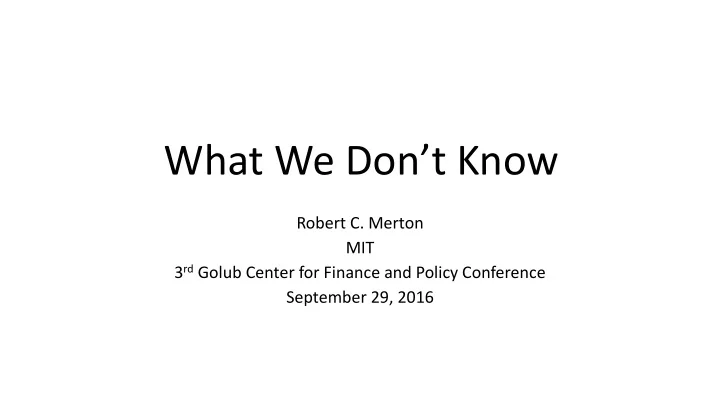

What We Don’t Know Robert C. Merton MIT 3 rd Golub Center for Finance and Policy Conference September 29, 2016
What is Worse than “Not Knowing”? “Believing You Know When You Do Not” About the Financial Crisis: A Twenty-One-Book Review” Andrew Lo Journal of Economic Literature 2012 50:1 151-178 SEC change in June 2004 “ Changes in SEC Rule 15c3–1, the so-called “net capital rule” by which the SEC imposes net capital requirements and, thereby, limits the leverage employed by broker-dealers.” Former SEC Chief Economist Mr. Pickard claims change materially loosened leverage and in editorials and articles several eminent economists and even the NYTimes took ownership, by asserting this was one of the 6 main causes of the financial crisis, despite the complete denial of that statement by then current SEC Chief Economist Erik Sirri. Observation: Before trying to fix a phenomenon or assign blame for that phenomenon, first establish that the phenomenon actually happened
Derivatives as Financial Weapons of Mass Destruction Oft-repeated Warren Buffett quote: “In our view, however, derivatives are financial weapons of mass destruction, carrying dangers that, while now latent, are potentially lethal,” wrote Buffett in Berkshire Hathaway’s 2002 annual letter.” • Berkshire wrote $billions of over-the-counter stock index equity put options from 2004 – 2010 • In 1998, Berkshire was part of a 3-firm consortium that offered to buy Long- Term Capital Management’s portfolio that included $1.2 trillion in notional derivatives • Has the press or any of the quote users asked Warren Buffett why he knowingly would have Berkshire buy or sell these weapons?
Major Financial and Economic Crisis 1970s: Risk Explosion and Stagflation in USA • Multi-dimensional explosion of volatilities in the western economies reflected in financial systems • Fall of Bretton Woods currency system • First oil crisis in 1973-4 and a second one in 1979 • Double-digit inflation in the US highest since Civil War • High unemployment ~9%: • “Stagflation” unknown, and still unsolved, economic disease • Stock market fell 50% in real terms mid 1973 – 1974 • Double-digit interest rates , highest since Civil War • No mortgage money available: Regulation Q • 1973-1975 recession was really a 1970s recession because its effects extended into the 1980s
“ There Has Not Been a Financial Innovation Useful to Society Since the ATM” 1970s Explosion of Extraordinary Financial Innovation in USA, in Response to Enormous Risk Shocks • Option exchange: financial value insurance • Financial futures for currencies, interest rates, stocks • NASDAQ , first electronic stock market • Money market funds, high-yield and floating rate bonds • Index funds Stage Coach Fund 1970 & Vanguard 1975 • TIAA-CREF international diversification in stocks 1972 • ERISA 1974 modern employer-funded pension system • May Day 1975 negotiated commissions & Vanguard created • Debt securitization and creation of a national mortgage market • Interest rate swap –eliminates the largest bank risk • Eliminate destructive regulations: deposit rate ceilings • Foundation set for globalization of capital markets: global diversification • Derivative markets have been adopted around the world since.
On the Need to Value the Benefits and Cost of Regulation • Trust has two components: 1. trustworthy and 2. competence. • There is no alternative to trust when the product or service is “inherently opaque “ And so cannot be made transparent. • Consumers of financial services lost both components of trust in providers and their regulators in the 2008-9 crisis. The continuing large shift away from active managers to indexing is evidence that consumers are seeking transparent passive strategies as a substitute for potentially better- performing opaque active ones as a result of this loss of trust. • Restoration of trust in both providers and regulators will be served by cost – benefit analyses for both. • Golub Center for Finance and Policy has as it mission to be a trusted institution on what are the data and the analysis of those data.
Recommend
More recommend